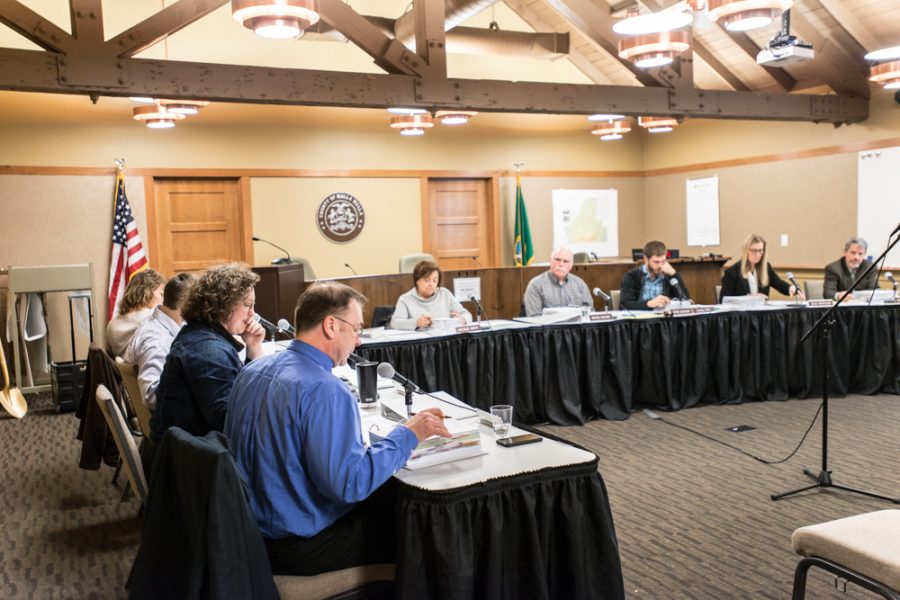
Whitman got a taste of one of America’s more provocative political flavors on Friday, Sep. 16, 2011 when members of the LaRouche movement, a political action committee known for its extremism, paid the campus a visit. The two activists spent several hours on the corner of Boyer Avenue and Park Street, where they exchanged passionate words with a crowd of students drawn by the LaRouche posters that depict President Barack Obama with a Hitler mustache photoshopped onto his face.
LaRouche advocates the forced resignation of Obama, the creation of a North American Water and Power Alliance (NAWAPA) and reinstatement of the Glass-Steagall act of 1933, an act that imposed a separation between commercial and investment banking. The act was repealed in 1999 after a decades-long struggle in congress. Members of the LaRouche movement are commonly seen tabling on college campus through-ways with their posters of Obama, bearing the slogans “Dump Obama” and “Invoke the 25th amendment.”
The image of Hitler’s mustache on the president’s face provoked disbelief and disgust from many who passed by the table on Friday afternoon.
“Are we serious here? Is this really a real thing?” said junior Woody Sorey. “This is obnoxious beyond obnoxious.”
“It draws attention but it’s extremely offensive,” said sophomore Signe Burke.
“It’s disrespectful,” said one community member who asked to remain anonymous due to her connection to the Whitman campus. She added that she was okay with the LaRouche members tabling outside Reid.
“You have to get a point across, if you believe in it,” she said.
When students questioned the women as to why they saw the Hitler mustache as justifiable, the LaRouche members emphatically stated that Obama’s policies, particularly cuts to social security, were killing people. Though they call for the resignation of Obama, LaRouche does not identify with the Republican party or the Tea Party.

“We put a mustache on Rand Paul,” said one of the LaRouche activists, who declined to give her name. “A lot of people deserve the Hitler mustache.”
In the United States, LaRouche candidates campaign as democrats. There are currently six LaRouche candidates for congress on the democratic slate nationwide, one of whom is Dave Christie of Washington. The women who visited Whitman on Friday traveled from Seattle to Eastern Washington in order to attend a LaRouche conference in Kennewick. One of the women, whose gave her first name as Hadiye, said that she first became interested in LaRouche in 2007 during the Bush administration. She recalled that she was upset about the wars in Afghanistan and Iraq, and the threat of war with Iran.
“That scared me,” she said. “We got family there [in Iran].”
When asked about the choice to visit Whitman, she expressed her desire to talk to students.
“It’s different [at Whitman], we normally just go to post offices,” she said. “Here, people are in some type of academic bubble, not in the real world. It’s different. At first it’s frustrating, but its understandable.”
The presence of the activists undoubtedly sparked discussion within the campus community, but many felt that the use of the Hitler mustache on Obama’s face was an unacceptable way to start a conversation.
“Speaking from the professional side, I understand the tactic. But I think the tactic reflects what’s wrong with politics,” said Ruth Wardwell, assistant vice president of communications. “Because members of previous generations of my family were killed in the Holocaust, I have a visceral reaction to the use of Hitler in any way, shape or form. I find it offensive.”
Still, some Whitman students appreciated the opportunity for discourse and exposure to political views that are outside of the mainstream.
“It’s refreshing to see something that’s creating so much dialogue,” said senior Daria Reaven. “Sometimes Whitman can be a politically apathetic institution.”
But the dialogue was amongst students; neither students nor the activists felt that a discussion had occurred between them.
“I haven’t heard one actual argument,” said a LaRouche member. “I’m really disappointed in this college.”
Senior Katie DeCramer also expressed disappointment.
“It’s really important to conduct these kind of discussions with respect, and I haven’t seen that,” she said. “From both [the students and the activists’] sides. But I’m happy that people are talking.”
“It’s sad that the shock factor is what’s allowing discussion to be triggered,” said Reaven.















